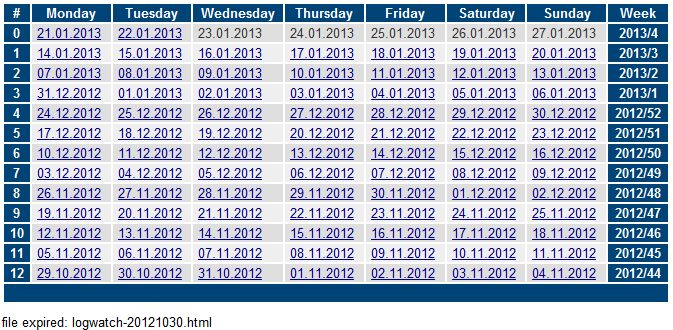Introduction
This code example shows how to create a index file over a set of timestamped log files.
#!/usr/bin/perl -w
# ----------------------------------------------------------------------- #
# Copy the $SOURCEFILE to a new timestamped history file #
# and build the history index based on the timestamped #
# files we found. Delete files older then max history. #
# #
# 20080110 support[at]frank4dd[dot]com #
# #
# we need Date::Calc, i.e. apt-get install libdate-calc-perl (Debian) #
# ----------------------------------------------------------------------- #
use strict; # force to be strict
use Date::Calc qw(:all); # for date calculations
# Global Variables
use vars qw( $head_html $page_html $WEBDIR $SOURCEFILE $FILEPREFIX $INDEXFILE $fh @today );
# directory to create the index and history pages in
$WEBDIR = "/home/htdocs/admin/html/logwatch/frank4dd.com";
# source report to build history from
$SOURCEFILE = $WEBDIR."/logwatch.html";
# full path and name of the new index page
$INDEXFILE = $WEBDIR."/history-index.html";
# filename prefix for history pages
$FILEPREFIX = "logwatch-";
# ----------------------------------------------------------------------- #
# this function takes the formerly generated $SOURCEFILE to create a copy #
# with the name [$FILEPREFIX][yyyymmdd].html for keeping a file history. #
# ----------------------------------------------------------------------- #
sub timestamp_reportfile {
my($DESTFILE) = "";
# get todays date
@today = Today();
# add a leading zero (month)
if($today[1] < 10) { $today[1] = "0".$today[1]; }
# add a leading zero (day)
if($today[2] < 10) { $today[2] = "0".$today[2]; }
# create the full path to the file we want to create a hardlink for
$DESTFILE .= $WEBDIR."/".$FILEPREFIX.$today[0].$today[1].$today[2].".html";
# debug only
# print "New Name: $DESTFILE\n";
# should we re-run the sript, we need to delete the former copy
if(-r $DESTFILE) { unlink($DESTFILE); }
# create the hardlink
link($SOURCEFILE, $DESTFILE) || die "Cannot create link for $SOURCEFILE";
}
# ----------------------------------------------------------------------- #
# this function creates the standard html header + top description tables #
# ----------------------------------------------------------------------- #
sub create_htmlheader {
my($pagetitle) = "Logwatch Report History";
my($hostname) = `hostname`;
my($rundate) = `/bin/date \"+%d.%m.%Y %H:%M\"`;
$head_html = << "EoText";
<html>
<head>
<title>$pagetitle</title>
<link rel=stylesheet type=text/css href=../style/style.css>
</head>
<body>
<p><center>
EoText
}
# ----------------------------------------------------------------------- #
# this function creates the history index table and rest of the html body #
# ----------------------------------------------------------------------- #
sub create_htmlpage {
my($histweeks) = 12;
my($histdays) = $histweeks * 7;
my(@weekdays) = ( '#', 'Monday', 'Tuesday', 'Wednesday', 'Thursday',
'Friday', 'Saturday', 'Sunday', 'Week' );
my(@weekofyr);
my(@daydate);
my($weekstr);
my($HISTFILE);
my($EXPIREFILE);
my(@filestat);
my($time_now);
$page_html = "<table>\n";
$page_html .= "<tr>";
# create the X-axis header columns
my($j) = 0;
while ( $j < 9 ) {
$page_html .= "<th>";
$page_html .= $weekdays[$j];
$page_html .= "</th>";
$j++;
}
$page_html .= "</tr>\n";
# start creating the data rows
my($i) = 0;
while ( $i <= $histweeks ) {
@today = Today();
@weekofyr = Week_of_Year(Add_Delta_Days(@today, -($i*7)));
$weekstr = $weekofyr[1]."/".($weekofyr[0]);
$page_html .= "<tr>";
# Y-axis startheader shows the history number
$page_html .= "<th>";
$page_html .= $i;
$page_html .= "</th>";
my($j) = 0;
while ( $j < 7 ) {
@daydate = Add_Delta_Days(Monday_of_Week(@weekofyr),$j);
if($daydate[2] < 10) { $daydate[2] = "0".$daydate[2]; }
if($daydate[1] < 10) { $daydate[1] = "0".$daydate[1]; }
$HISTFILE = $FILEPREFIX.$daydate[0].$daydate[1].$daydate[2].".html";
$page_html .= "<td class=\"date\">";
if(-r $WEBDIR."/".$HISTFILE) {
$page_html .= "<a href=\"".$HISTFILE."\">";
$page_html .= $daydate[2].".".$daydate[1].".".$daydate[0];
$page_html .= "</a>";
}
else {
$page_html .= $daydate[2].".".$daydate[1].".".$daydate[0];
}
$page_html .= "</td>";
$j++;
}
# Y-axis endheader shows the week of year
$page_html .= "<th>";
$page_html .= $weekstr;
$page_html .= "</th>";
$page_html .= "</tr>\n";
$i++;
}
# we expire the oldest file in history starting from here:
$page_html .= "<tr>\n";
$page_html .= "<td class=\"date\" colspan=9>\n";
# expire the file older then in the current view
@daydate = Add_Delta_Days(@today, -$histdays);
if($daydate[2] < 10) { $daydate[2] = "0".$daydate[2]; }
if($daydate[1] < 10) { $daydate[1] = "0".$daydate[1]; }
$EXPIREFILE = $FILEPREFIX.$daydate[0].$daydate[1].$daydate[2].".html";
$page_html .= "file expired: ".$EXPIREFILE;
# delete the expired file and report about it
if(-r $EXPIREFILE) {
unlink($EXPIREFILE);
$page_html .= "<br>... file successfully deleted.";
}
# close the field, row and table
$page_html .= "</td>\n";
$page_html .= "</tr>\n";
$page_html .= "</table>";
}
# ----------------------------------------------------------------------- #
# main(), run the functions in order and write the history index file #
# ----------------------------------------------------------------------- #
timestamp_reportfile();
create_htmlheader();
create_htmlpage();
# For debug, enable terminal output
# print $head_html;
# print $page_html;
# write the index page
open( OUT, ">$INDEXFILE" )
or die ("$0: can't open $INDEXFILE for writing: $!\n");
$fh = *OUT;
print $fh $head_html;
print $fh $page_html;
print $fh "</body></html>";
close( OUT );
# ----------------------------------------------------------------------- #
# end of main(), end of program, end of file #
# ----------------------------------------------------------------------- #Example Screenshot
The following screenshot demonstrates the basic usage of the code:
